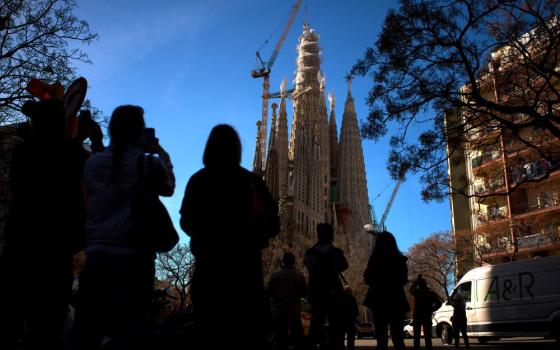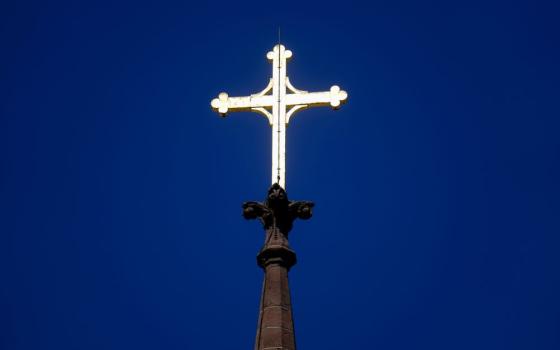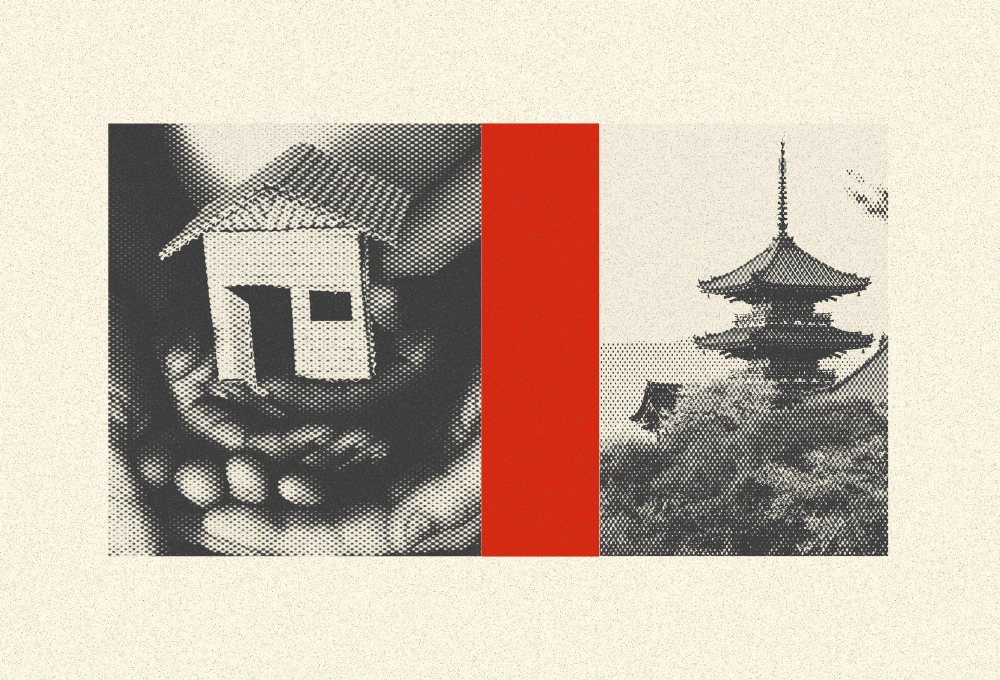
(GSR graphic/Olivia Bardo)
Editor's note: This story is part of Global Sisters Report's yearlong series, "Out of the Shadows: Confronting Violence Against Women," which will focus on the ways Catholic sisters are responding to this global phenomenon.
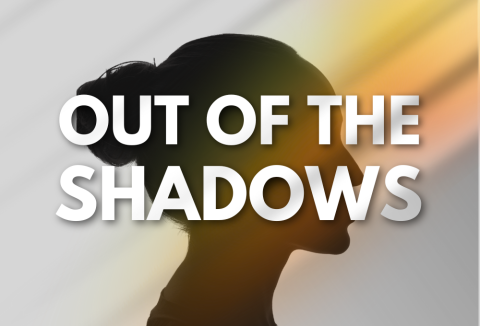
(GSR logo/Olivia Bardo)
A Tokyo-based nun and other members of the Sisters Adorers are dedicated to helping girls and women facing vulnerabilities or living in distress.
Wearing a silver patent pectoral cross over her navy blue collarless shirt, Sr. Manuela Kano of the Sisters Adorers, introduces herself, saying, "I'm Manuela. Emmanuela means the Lord is with you."
Based in Tokyo, the 67-year-old nun works with women who are survivors of domestic violence, sexual abuse, exploitation or abandonment — in several cities across Japan.
Born Atsuko Kano in Tokyo, her inspiration to become a Catholic and a nun stemmed from witnessing the work of the Sisters Adorers, officially known as the Handmaids of the Blessed Sacrament and of Charity — a congregation founded in the 19th century in Spain to support vulnerable girls and women.
Although raised in a Protestant household, Kano said she long resisted religion and its strict teachings. She said that her grandfather often told her, "You will go to hell if you don't get baptized."
That resistance began to fade during her university days, when she lived in a dorm operated by the Sisters Adorers in Tokyo's Nerima ward.
"One day, we heard noises of violent banging on the door coming from a girl's room. The sisters went to comfort her. At first, I didn't understand, but later I learned their mission," she said.
She then discovered that the nuns' main responsibility was to care for young women, some of whom were dealing with "invisible trauma."
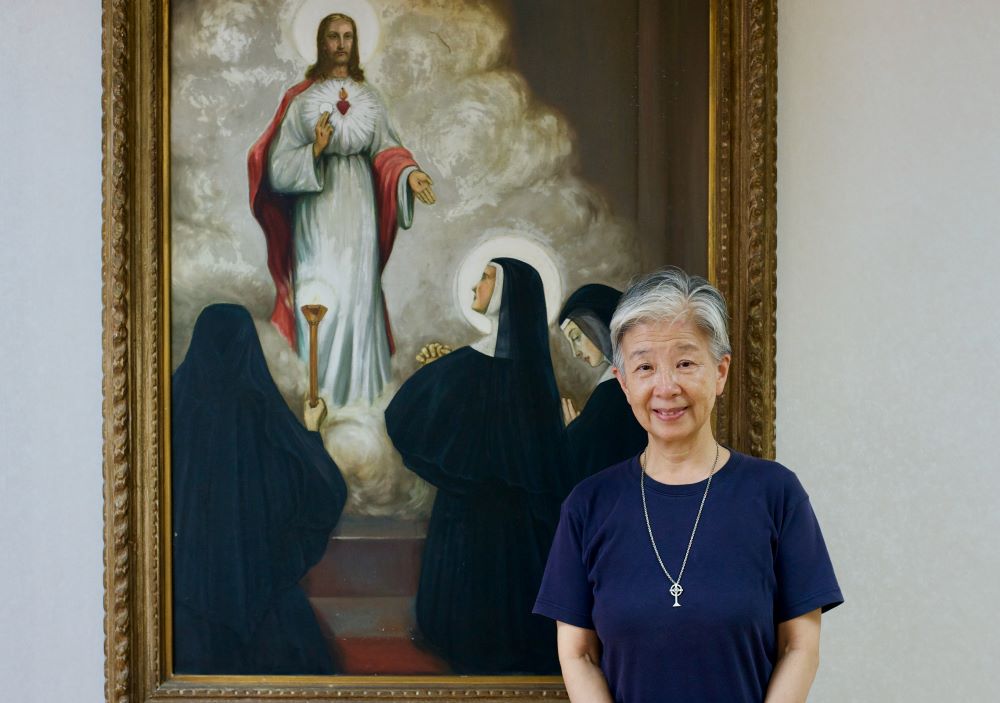
Sr. Manuela Kano of the Sisters Adorers lives in Tokyo and works with women who are survivors of domestic violence, sexual abuse, exploitation or abandonment in several cities in Japan. Kano is pictured in the convent of the Sisters Adorers in Tokyo on July 29. (Keiko Kurane)
After three years of discernment, Atsuko Kano joined the order to become Sr. Manuela Kano and begin "a life dedicated to Jesus to serve in humility and joy."
"We are fortunate to pray with and support these girls and women," she said.
A bruised reed will not be broken
The congregation operates houses and shelters across Japan, including in Yokohama, Nerima, Fukuoka and Setagaya. Most of the girls and women she helps care for are referred by local social welfare offices.
Kano said they also support foreign nationals, including Filipinas, Thais, Americans and South Americans, who are vulnerable or are in distress.
Her companion, Sr. Yoko Matsuoka, who leads the Association of Major Superiors of Religious Women in Japan, quoted Isaiah 42:3, "A bruised reed he will not break, and a smoldering wick he will not snuff out," to illustrate the work of the congregation.
Kano distinguished between the congregation's houses and shelters. In a "house," the girls and women start preparing for independent living with daily support. In contrast, the "shelter" functions as a short-term refuge for those escaping violence at home.
The nun said the names or locations of the houses and shelters cannot be disclosed due to strict privacy rules in Japan.
Kano said that 13 families are currently living in the Yokohama house, with three rooms designated as shelter space.
Four shelter rooms in Fukuoka, each designed for one person, are fully occupied. In Setagaya, three rooms are reserved as a house and shelter, but are currently unoccupied.
In Nerima, 12 rooms within a house function as shelter, where around a dozen women ages 20 to 39, mostly survivors of abuse or family conflict, can stay. Kano was unable to share specific details of any particular house or the total number of people under their care.
'Rich people can access therapy. But those who need it most, the poor, cannot afford it. That's why we are here.'
—Sr. Manuela Kano
In addition to providing accommodation and helping educate them, the nuns support the women in their daily lives, helping with routine tasks, navigating public systems and preparing them for independent living.
Currently, six nuns work directly with Kano on this mission, while three others collaborate with other staff.
"We used to be almost 30 sisters in Japan," she recalled. "But many have already retired; only nine are active now."
Structures for life ahead
The nuns' shelter follows a routine: waking up at the same time, doing chores and participating in structured activities. "It is to help them regain a sense of stability and normalcy," Kano said.
A system and training are "essential to regain normal life," she said, adding that they also offer computer lessons, management and basic math to women under their care.
However, they are also relaxed about certain aspects of life, such as counseling, which is "informal and integrated into daily life."
"It's not, 'Sit down and talk now,' " Kano explained. "Usually, we talk while walking or doing something. Or whenever they want to speak."
The women also get help preparing for employment so they can live independently. For example, a woman who learned to use Microsoft Excel was hired the day after her job interview. "She was very courageous," the nun said.
Not all cases are as easy. Kano shared one complex case of a girl survivor of childhood sexual abuse, who struggled with intense emotional trauma.
"She used to punch walls and fountains when she got overwhelmed," Kano said. "At one point, I got angry and said I'd never see her again."
Years later, the girl reached out for help. Kano and another staff member stood by her through her crisis.
"Now, she's happier. She sends me smiley-face messages. It took 10 years."
Spreading in East Asia
The Sisters Adorers arrived in Japan some 40 years ago, and in 2023, they became the Delegation of Japan.
The Delegation has 40 nuns working in Japan, Vietnam and Cambodia. In 2024, the congregation’s general chapter appointed Kano as the delegate to lead the nuns for the next three years.
Kano said the church has a vital role to play in defending the dignity of girls and women. "Shelter comes first," she said. "There's no point in education if there's no safe place to live."
The Sisters Adorers began responding to the needs of girls abandoned and trafficked into the sex industry in Cambodia and Vietnam in the 2000s.
"In Cambodia, many girls are thrown out and treated as having no value," Kano said. "We saw children abandoned on the street. The need was overwhelming."
Advertisement
With limited resources, the congregation partnered with NGOs in Cambodia to provide shelter and education.
The nuns continue their mission through their nonprofit organization, Renascer, which is Portuguese for "reborn," said Kano, who heads the nonprofit.
The biggest challenge is that "there are not enough economic resources," she said with a laugh. "But we manage. We are always busy."
Kano said Japan's social welfare system "is well-structured," but it should "do more to support emotional healing."
Japan ranked 118th out of 148 countries in the World Economic Forum's 2025 Global Gender Gap Index, the lowest among G7 nations.
"Rich people can access therapy," Kano said. "But those who need it most, the poor, cannot afford it. That's why we are here."



